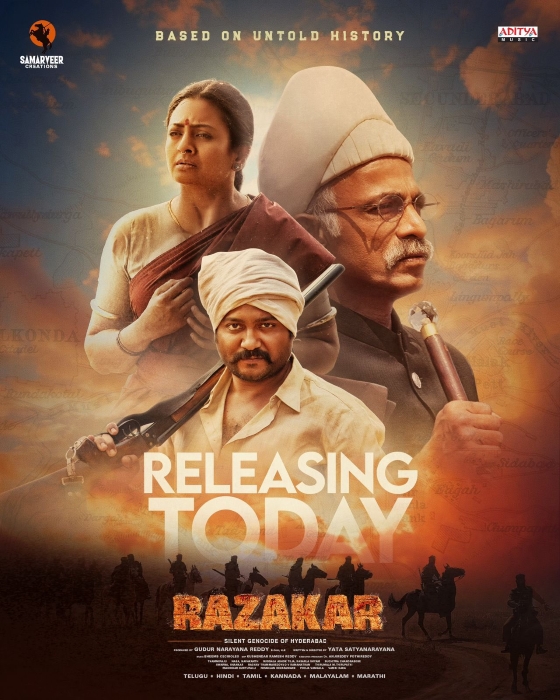In the vast expanse of India’s rich historical tapestry, certain chapters remain less explored, less understood. “Razakar: The Silent Genocide of Hyderabad,” a recent cinematic endeavor directed by Yaata Satyanarayana, takes a bold step into one such chapter—the Hyderabad Liberation Movement of 1948. With a talented ensemble cast and a runtime of 2 hours and 46 minutes, this Telugu film isn’t just a movie; it’s a journey into the heart of a pivotal moment in India’s past.
Set against the backdrop of early post-independence India, the film delves into the resilience and struggles of the people of Andhra Pradesh. It’s a tale of valor, identity, and the quest for freedom—a narrative woven with compelling characters and a meticulously crafted historical setting.
From the very first glimpse offered by its trailer, “Razakar” promises an immersive cinematic experience. The performances of its lead actors, including Raj Arjun, Bobby Simha, Anasuya Bharadwaj, and Vedhika, have captured the attention of both critics and audiences alike. Their portrayals breathe life into characters whose stories deserve to be told, felt, and remembered.
Critics have hailed “Razakar: The Silent Genocide of Hyderabad” as a brave attempt to delve into a sensitive historical topic. It’s a film that doesn’t shy away from confronting the harsh realities of the past, yet it does so with a certain finesse—a testament to the director’s heartfelt dedication to the project.
The cinematography, masterfully executed by Ramesh Kushender, adds another layer of depth to the narrative. Each frame is a canvas upon which the story unfolds, drawing viewers deeper into the world of 1940s Hyderabad.
But it’s not just the technical aspects that shine in this film; it’s the emotional resonance that lingers long after the credits roll. Through the lens of “Razakar,” audiences are invited to witness the valor and heroic acts of the people of Hyderabad—a reminder of the sacrifices made in the pursuit of freedom.
Of course, no film is without its critics, and “Razakar” is no exception. Some have voiced concerns over its portrayal of sensitive historical events, citing a potential right-wing Hindutva narrative. However, amidst differing perspectives, one thing remains clear: this film sparks discussions, ignites debates, and encourages a deeper exploration of India’s complex past.
For those eager to embark on this cinematic journey, the trailer offers a tantalizing glimpse into what awaits. It’s a preview that promises drama, emotion, and a window into a bygone era—a perfect appetizer for what’s sure to be an enriching experience.
In the end, “Razakar: The Silent Genocide of Hyderabad” isn’t just a movie; it’s a testament to the power of storytelling. It’s a reminder that history is more than just dates and facts—it’s a tapestry woven with the threads of courage, resilience, and the indomitable spirit of the human soul. So, sit back, immerse yourself in the world of 1940s Hyderabad, and let “Razakar” take you on a journey you won’t soon forget.
For more entairtainment neews click here.

[…] Movie Review: A Rollercoaster Ride of Action and Drama Razakar: The Silent Genocide of Hyderabad” – Unveiling History Through Cinema Rishabh Pant’s Incredible Six Stuns Fans During Delhi Capitals’ IPL 2024 Training […]
[…] Also find Razakar: The Silent Genocide of Hyderabad review. […]